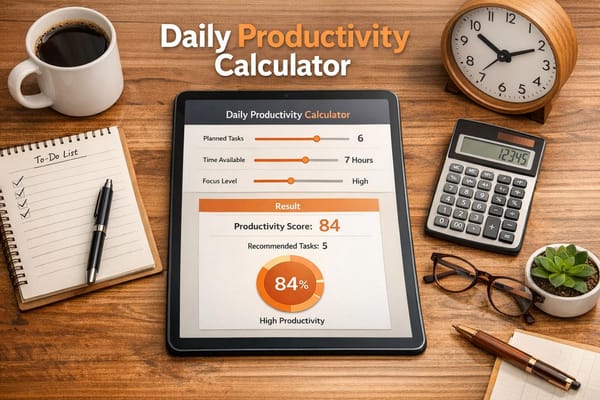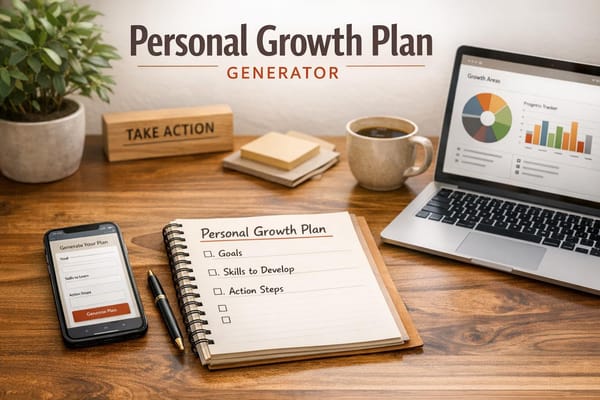How Personal Values Build Resilience
Explore how aligning your life with personal values can enhance resilience and provide clarity during life's challenges.

When life gets tough, your personal values can be your greatest asset. They act as a compass, guiding your decisions and helping you stay steady during uncertain times. Values like honesty, family, or growth don’t shift with circumstances - they provide clarity, purpose, and self-respect, even when challenges arise.
To make the most of your values:
- Identify your core values: Reflect on moments of pride or frustration to uncover what truly matters to you.
- Make decisions aligned with your values: Use them to guide choices, big or small, for consistency and confidence.
- Turn values into habits: Small, daily actions - like family dinners or mindful walks - reinforce your principles.
- Surround yourself with like-minded people: Relationships with those who share your values offer support and perspective.
- Track and adjust: Regular self-reflection ensures your values stay relevant as you grow.
Living by your values isn’t just about surviving challenges - it’s about thriving with purpose and clarity. Start small, stay consistent, and let your values shape a life you’re proud of.
AMA: Can Starting with Values Make You More Resilient? - Brad Hook
Finding and Following Your Core Values
It's easy to go through life without ever stopping to figure out what truly matters to you. Many people rely on external expectations instead of exploring their own priorities. But taking the time to uncover your core values can create a strong foundation that helps you navigate challenges with confidence. When you understand what drives you, your decisions align more closely with your true self, giving you the resilience to handle whatever life throws your way. Here's how to identify and apply your core values.
Steps to Find Your Personal Values
Discovering your values requires honest reflection and a closer look at your past experiences. Start by thinking about the moments when you felt most fulfilled or proud of yourself.
Think back to the times you felt energized or deeply satisfied. Was it when you helped a colleague, stood up for someone, or spent quality time with family? Write these moments down and consider the values they represent. For instance, if assisting a coworker felt rewarding, you might value collaboration or service to others. If defending someone left a lasting impression, perhaps justice or fairness is central to who you are.
On the flip side, examine times when you felt frustrated, angry, or disappointed. These emotions often point to situations where one of your values was violated. For example, if a friend breaking a promise upset you, trust or reliability could be key values. If a chaotic workplace drove you crazy, you might value organization or efficiency.
Another helpful exercise is to think about your role models. Who do you admire most - whether they're family members, historical figures, or public personalities? What qualities do you respect in them? These traits often reflect values you hold, even if you haven't fully recognized them yet.
Also, pay attention to how you spend your time when no one else is influencing your decisions. If you often choose to learn new skills, growth or knowledge might be guiding principles. If you frequently give to charity, compassion or social responsibility could be at the heart of your actions.
Finally, ask yourself some direct questions: What would you want people to say about you at your funeral? What principles would you never compromise, no matter the cost? What causes or issues make you feel deeply passionate or emotional? The answers to these questions can shine a light on what truly defines you.
Benefits of Living by Your Values
Once you've identified your core values, they can guide you toward a more purposeful and satisfying life. Living in alignment with your values can impact everything from your decision-making to your relationships.
| Living by Your Values | Acting Without Clear Direction |
|---|---|
| Decision-making: Make quick, confident choices based on principles | Decision-making: Struggle with uncertainty and regret |
| Stress levels: Lower stress from staying true to your priorities | Stress levels: Higher anxiety from conflicting goals |
| Relationships: Build deeper connections with like-minded people | Relationships: Experience surface-level connections and misunderstandings |
| Self-confidence: Feel secure in your identity and choices | Self-confidence: Struggle with self-doubt and confusion |
| Career satisfaction: Find meaning in work aligned with your values | Career satisfaction: Feel detached or unmotivated at work |
| Resilience: Draw strength from your principles in tough times | Resilience: Feel unmoored during challenges |
Living by your values creates a positive cycle. Each decision you make that aligns with your principles reinforces your confidence and trust in yourself. Over time, this self-trust becomes a powerful tool, especially when you're under pressure to compromise.
People who live according to their values often describe their lives as more authentic. They don't feel the need to act differently in various situations because their core remains consistent. This authenticity not only makes life simpler but also attracts others who share similar values, leading to stronger relationships and support systems.
Your values also act as a filter for opportunities and obligations. Instead of saying yes to everything and feeling overwhelmed, you can evaluate commitments based on whether they align with what matters most to you. If something fits your values, you can embrace it wholeheartedly. If it doesn't, you can decline without hesitation or guilt.
In moments of uncertainty or adversity, knowing your values allows you to act with clarity and purpose. While external circumstances may shift, your values remain steady, giving you the grounding needed to make thoughtful, deliberate choices instead of reacting impulsively.
Building Resilience Through Value-Based Actions
Understanding your core values is just the beginning. The real power lies in putting those values into action, especially during challenging times. By turning abstract principles into concrete, value-driven decisions, you not only navigate difficulties more effectively but also strengthen your sense of self and build the confidence to face future obstacles.
Developing a Growth Mindset
Your values can help you reframe setbacks as opportunities for growth. Instead of seeing challenges as failures, you can align them with your values to find meaning and direction.
For instance, if you prioritize learning or personal growth, a job rejection can become a chance to sharpen your skills or reassess your career goals. Instead of dwelling on disappointment, you might ask, "What can this teach me?" This shift transforms setbacks into stepping stones.
Similarly, those who value perseverance or determination often draw strength from past experiences. Remembering how you’ve overcome challenges before can reinforce your identity as someone who refuses to give up.
Pairing a growth mindset with values like curiosity or creativity can open new doors. Instead of asking, "Why is this happening to me?" you might wonder, "What new solutions can I explore?" This approach often leads to breakthroughs that wouldn’t emerge from a fear-based mindset.
Your values can also help you maintain perspective. For example, if you value family or relationships, a career setback might remind you that your worth isn’t defined by professional achievements alone. This broader perspective can keep temporary struggles from overwhelming you.
Once you’ve embraced a growth mindset, gratitude can further enhance your resilience.
Practicing Gratitude and Staying Positive
Gratitude becomes more impactful when it’s tied to your core values. Instead of generic expressions of thankfulness, focus on the aspects of life that align with what matters most to you.
If you value community or connection, take time to appreciate the people who support and inspire you. Reflect on acts of kindness or moments of shared understanding. This targeted gratitude reinforces your sense of belonging and reminds you that you’re not facing challenges alone.
For those who value growth or learning, gratitude can highlight the lessons hidden in difficult experiences. Even painful moments can offer clarity, empathy, or strength when viewed through this lens.
Values like service or contribution can turn gratitude into action. When you’re thankful for the support you’ve received, you might feel inspired to pay it forward. This creates a positive cycle where gratitude fuels actions that align with your values, leading to even more reasons for appreciation.
During stressful times, gratitude can be a powerful grounding tool. If you value creativity, you might focus on the joy of working on meaningful projects. If you value justice, reflecting on moments when you’ve made a difference can restore your sense of purpose.
Regular gratitude practices can also help you recognize when your life already reflects your values, even if external circumstances aren’t ideal. This awareness fosters contentment and reduces the need to seek constant validation from external sources.
Using Self-Reflection to Stay Grounded
After cultivating a growth mindset and practicing gratitude, self-reflection becomes essential for staying aligned with your values. It’s easy to lose sight of your principles when external pressures mount, but regular reflection helps you stay true to what matters most.
Take time to honestly evaluate whether your actions align with your values. For example, if you value integrity but notice yourself compromising in ways that feel uncomfortable, self-reflection can help you identify and address these misalignments before they become habits.
Set aside time each week to ask yourself questions like: "How did I honor my values today?" or "What could I do differently tomorrow?" These check-ins can highlight moments when you acted in alignment with your principles or reveal areas where adjustments are needed.
Self-reflection also allows you to adapt your approach as circumstances change. While your core values remain steady, how you express them might need to evolve. For instance, if you value family but find your work responsibilities increasing, reflection can help you discover new ways to prioritize relationships without sacrificing your professional goals.
This practice is especially helpful during major life decisions or transitions. By regularly reconnecting with your values, you gain the clarity and confidence to make choices that support your long-term well-being instead of chasing short-term comfort or convenience.
Adding Values to Your Daily Life
Once you've identified your core values, the next step is weaving them into your everyday life. This doesn't mean upending your entire routine overnight. Instead, it's about making small, intentional choices that align with what truly matters to you. When your daily actions reflect your values, you create a solid foundation that helps you navigate life's challenges with greater ease. These consistent practices naturally reinforce the resilient mindset you've been building.
Making Choices Based on Your Values
Your values aren't just abstract ideas - they're a guide for making decisions, big and small, that strengthen your sense of self. Every choice you make, no matter how minor, shapes your ability to stay resilient. When you consistently act in line with your values, you build confidence in your ability to remain true to yourself, even when things get tough.
Start with the bigger decisions. For example, if work-life balance is a priority, consider how your career choices reflect that. This might mean passing on a promotion that demands 70-hour workweeks or negotiating for flexible hours that allow you to spend more time with family.
Let your values steer all your decisions. If you value health, you might choose to walk to work, combining exercise with your commute. If environmental responsibility is important to you, buying local produce or using public transportation could be ways to align your actions with your principles.
Financial choices also become clearer when filtered through your values. For instance, if you value security, you might focus on saving for an emergency fund rather than splurging on luxury items. If you prioritize experiences over possessions, you might allocate your budget to travel or skill-building opportunities instead of material goods.
A helpful practice is to pause and ask yourself, "Does this align with my values?" This simple question can prevent regret and guide you toward a life that feels more authentic and fulfilling. Over time, consistently living by your values fosters what psychologists call "value congruence" - a state where your actions and beliefs are in harmony. This alignment reduces inner conflict and stress, making it easier to handle external challenges.
Creating Habits That Match Your Values
Identifying your values is just the beginning; living them requires action. The most effective way to do this is by creating habits that naturally support your principles. These habits become daily rituals that help you stay grounded and resilient, no matter what life throws your way.
Start with small, consistent habits that reflect your values. For instance, if you value mindfulness, you might develop a daily meditation practice or take a walk without distractions. If family is a priority, you could make it a point to share breakfast together or read bedtime stories with your kids.
Morning and evening routines are great opportunities to incorporate your values. Someone who values gratitude might write down three things they're thankful for each night. At work, if you value excellence, you could make it a habit to double-check your work or seek constructive feedback. If collaboration resonates with you, regularly checking in with team members or sharing credit for successes can reinforce that value.
The key is starting small and being consistent. Instead of committing to an hour of meditation, start with five minutes. Instead of aiming to finish a book each week, focus on reading one chapter. These small, repeated actions create momentum, helping you live your values more fully and build resilience over time.
Building Relationships With People Who Share Your Values
The people you surround yourself with play a huge role in helping you stay true to your values. When you're connected to others who share similar principles, it becomes easier to stay committed to what matters most.
Seek out opportunities to connect with like-minded people in your existing circles. For example, if you value community service, you might join colleagues who volunteer regularly. If you prioritize continuous learning, consider starting a book club or joining a professional development group. These connections often form naturally when you're actively living your values.
Pay attention to relationships that either energize or drain you. People whose actions clash with your core values can create stress and make it harder to stay aligned with your principles. While you don't need to cut ties with everyone who thinks differently, it's worth being intentional about where you invest your emotional energy.
Workplace relationships are especially important since you spend so much time with colleagues. Look for mentors and peers who embody the values you admire. For example, if you value integrity, connect with people known for their honesty. If creativity inspires you, seek out those who challenge conventional thinking.
Family dynamics can be more complex, but you can still choose how to engage. Spend more time with relatives who support your growth and share your values, and set boundaries with those who don't. For instance, you might bond with a cousin who shares your entrepreneurial spirit while limiting interactions with family members who criticize your choices.
Remember, building relationships based on shared values is a two-way street. Be the kind of person others want to connect with by consistently demonstrating your principles. Show up reliably, communicate openly, and support others in pursuing what matters to them. When you live your values in relationships, you naturally attract people who appreciate and share those same ideals.
During tough times, friends and colleagues who share your values can offer perspective, encouragement, and practical support. They remind you of who you are and what you stand for, helping you stay grounded when it's easy to lose sight of your core beliefs.
Tracking and Improving Your Resilience Plan
Building resilience through your personal values isn’t something you do once and forget about - it’s an ongoing journey that requires attention and fine-tuning. Think of it like driving a car on a long road trip. You wouldn’t just set off without checking your fuel gauge or adjusting your route when needed, right? The same goes for resilience. You need to monitor your progress and make adjustments as life shifts. Here’s how you can stay on track.
Monitoring Your Progress
Tracking your progress is key to ensuring your resilience grows over time. One simple yet powerful tool for this is journaling. Set aside 10–15 minutes each evening to reflect on how your actions aligned with your values that day. Write about moments when you felt strong and grounded, as well as times when you struggled. For example, if integrity is one of your core values, note situations where you stood up for what was right, even if it was uncomfortable. Then think about how these actions influenced your stress levels and confidence.
Once a week, take a step back and ask yourself questions like: Which values did I honor? Where did I feel resilient? What challenges tested my values?
Pay close attention to your emotional cues. Feelings of satisfaction, energy, or calm often signal that your actions are in sync with your values. On the flip side, persistent feelings of frustration or anxiety might indicate a misalignment. As Martha Brown, a Master/3rd level Reiki Practitioner, explains:
"There is no set schedule for this. It seems like it's events in life that come along that bring about these reassessments".
You can also track specific behaviors tied to your values. For instance, if health is important to you, keep note of how often you choose nutritious meals or make time for exercise, even during stressful periods. If family is a top priority, track how much quality time you spend with loved ones. These small, consistent observations can reveal whether you’re living according to your principles.
At the end of each month, review your notes to identify patterns. Are you handling challenges better than you were a month ago? Do you feel more confident in your decision-making? These trends can help you see whether your value-based approach to resilience is making a difference.
Reviewing and Updating Your Values
As you grow, your values can shift - and that’s perfectly normal. Regular reviews help ensure your resilience plan stays relevant to your current priorities. Melanie White, Owner at Melanie J White Coaching, shares her perspective:
"I like to do a big picture life review at least once per year. Smaller scale work and life priorities much more often. To me this is being proactive and it helps stay on course and navigate challenges".
Consider scheduling monthly check-ins to spot broad trends and a deeper annual review during naturally reflective times, like your birthday or New Year’s. Ask yourself: Do my values still feel true to who I am? Have I discovered new principles that matter more now? Are there values I once prioritized but rarely act on anymore?
Major life events - such as a career change, marriage, parenthood, or the loss of a loved one - can also prompt a reassessment of your values. After such milestones, take some time to reflect on how your priorities may have shifted.
Peter Rennie, Winner of the National Award for Adult Education and HRD, offers this reminder:
"Most of us want to believe we have a stable set of values that are the foundation of our character. However, this is not true for most of us".
Reassessing your values isn’t a sign of inconsistency - it’s a sign of growth. Just like you build habits to reflect your values, regular reviews help you stay aligned with what truly matters. If you’re planning a big change, like starting a business, moving to a new city, or switching careers, take a moment to check whether these goals resonate with your values. If something feels off, it might be time to adjust your goals or acknowledge that your values are evolving. By refining your values over time, you’ll ensure your resilience plan stays aligned with the person you’re becoming.
Conclusion: Using Values to Build Resilience
Your values act as your anchor during life’s most challenging times. When you identify what truly matters and align your actions with those priorities, you create a sense of purpose that helps you navigate setbacks with clarity and determination.
This guide has explored how making decisions rooted in your core values can turn obstacles into opportunities for growth. By staying true to your principles, you cultivate resilience that not only helps you endure but also empowers you to thrive.
The beauty of value-based resilience lies in its simplicity. It doesn’t require expensive tools or specialized training. It starts with understanding what drives you at your core and committing to those principles in your everyday life. Whether that means carving out time for family when work feels overwhelming, standing firm in your integrity even when it’s difficult, or sticking to your health routines during stressful periods, these consistent, value-driven actions build lasting inner strength.
This approach offers immediate, meaningful change. Start by identifying your core values with an open mind. As Scott Jeffrey insightfully puts it:
"Values aren't selected; they are discovered".
Adopt what experts call a "Beginner’s Mind" - let go of preconceived ideas about who you think you should be and allow genuine insights to surface. Explore lists of common values, circling the ones that resonate most deeply with you. Reflect on your peak experiences and moments of frustration, as these often highlight what truly matters to you.
Keep in mind, building resilience through your values isn’t a one-time effort. It’s an ongoing process that evolves as you grow. The key is staying connected to what matters most to you right now and allowing that to guide your decisions. By weaving your values into your daily life, you continue the journey of value-based resilience.
At FromZeroToGrow, we believe that understanding your personal values is one of the most powerful steps you can take to create the life you want. When you’re grounded in what truly matters, you’re not just more resilient - you’re more confident, authentic, and capable of driving meaningful change.
The time to start is now.
FAQs
How can I figure out my core values if I’m not sure what’s most important to me?
If you're uncertain about your core values, take some time to reflect on the moments when you felt genuinely happy and fulfilled. These instances often reveal what’s most important to you. Consider the principles that influence your decisions or the legacy you hope to leave behind. Looking through examples of common values can also spark ideas and help you connect with the ones that truly matter.
Once you’ve identified your values, you’ll likely find a stronger sense of direction. This clarity can help you stay steady and resilient, even when life throws challenges your way.
How can I make sure my daily actions reflect my personal values?
Aligning Your Actions with Your Values
To ensure your daily life reflects what’s most important to you, start by figuring out what truly matters. Take some time to reflect on your beliefs and priorities. Tools like journaling can be incredibly helpful in uncovering and clarifying your core values. Once you’ve identified them, make it a habit to check if your actions and decisions align with those values. If they don’t, adjust as needed.
Next, set specific goals that are rooted in your values. Break these goals into smaller, manageable steps to help you stay on track and maintain consistency. Over time, living in sync with your values not only builds resilience but also keeps you grounded and true to yourself - even when life throws challenges your way.
How can I adapt my values as I grow and face new challenges without feeling like I’m losing myself?
Adapting your values as you grow is a natural part of evolving as a person. To navigate this without feeling like you're losing yourself, it helps to regularly take a step back and think about what truly matters to you. Your core values serve as your compass, so aligning your actions with these principles is key to maintaining both integrity and self-respect.
Change is inevitable, and life has a way of reshaping our priorities. As your circumstances shift, your values might, too - and that's okay. Making gradual adjustments, while staying self-aware and leaning on trusted mentors or friends for perspective, can keep you grounded. Staying connected to what feels meaningful to you will not only help you stay authentic but also give you the strength to face challenges with confidence.





